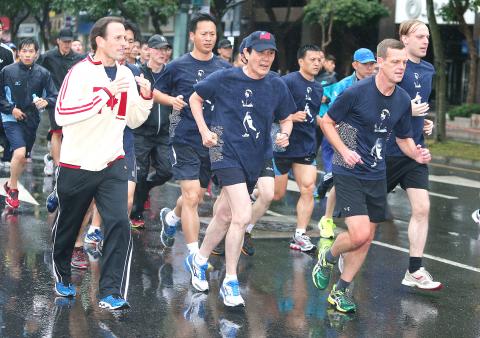The Presidential Office yesterday refuted a report that President Ma Ying-jeou (馬英九) was advised to stop running after he almost went into shock during a 5km event in November last year, saying that he runs every morning as usual.
Ma had an uncomfortable sensation in his waist and legs during the run last year as a result of not warming-up sufficiently, but he did not fall to the ground nor go into shock, the Presidential Office said in a press release in response to a report in the latest edition of the Chinese-language Next Magazine published yesterday.
After completing the 5km run, Ma walked back to his residence and took a rest before he continued with his scheduled visits in Yilan and Penghu counties, and in Taipei later that day, the Presidential Office press release said.

Photo: CNA
Ma felt much better after the rest, the Presidential Office said, rejecting a report that he was given oxygen and was told by his doctor that he should not run anymore.
The report was sheer fiction and ridiculous, the Presidential Office said, adding that Ma goes for a run every morning.
Ma joined the Terry Fox charity run on Nov. 15 last year along with a group of visiting Canadian parliamentarians, including John Weston, who chairs the Canada-Taiwan Parliamentary Friendship Group.
The annual event — which aims to raise funds for cancer research — is held in recognition of Canadian Terry Fox, who had his right leg amputated as a young man due to bone cancer, but still managed to run across Canada to raise money for cancer research before he passed away in 1981.

A Ministry of Foreign Affairs official yesterday said that a delegation that visited China for an APEC meeting did not receive any kind of treatment that downgraded Taiwan’s sovereignty. Department of International Organizations Director-General Jonathan Sun (孫儉元) said that he and a group of ministry officials visited Shenzhen, China, to attend the APEC Informal Senior Officials’ Meeting last month. The trip went “smoothly and safely” for all Taiwanese delegates, as the Chinese side arranged the trip in accordance with long-standing practices, Sun said at the ministry’s weekly briefing. The Taiwanese group did not encounter any political suppression, he said. Sun made the remarks when

The Taiwanese passport ranked 33rd in a global listing of passports by convenience this month, rising three places from last month’s ranking, but matching its position in January last year. The Henley Passport Index, an international ranking of passports by the number of designations its holder can travel to without a visa, showed that the Taiwan passport enables holders to travel to 139 countries and territories without a visa. Singapore’s passport was ranked the most powerful with visa-free access to 192 destinations out of 227, according to the index published on Tuesday by UK-based migration investment consultancy firm Henley and Partners. Japan’s and

BROAD AGREEMENT: The two are nearing a trade deal to reduce Taiwan’s tariff to 15% and a commitment for TSMC to build five more fabs, a ‘New York Times’ report said Taiwan and the US have reached a broad consensus on a trade deal, the Executive Yuan’s Office of Trade Negotiations said yesterday, after a report said that Washington is set to reduce Taiwan’s tariff rate to 15 percent. The New York Times on Monday reported that the two nations are nearing a trade deal to reduce Taiwan’s tariff rate to 15 percent and commit Taiwan Semiconductor Manufacturing Co (TSMC, 台積電) to building at least five more facilities in the US. “The agreement, which has been under negotiation for months, is being legally scrubbed and could be announced this month,” the paper said,

MIXED SOURCING: While Taiwan is expanding domestic production, it also sources munitions overseas, as some, like M855 rounds, are cheaper than locally made ones Taiwan and the US plan to jointly produce 155mm artillery shells, as the munition is in high demand due to the Ukraine-Russia war and should be useful in Taiwan’s self-defense, Armaments Bureau Director-General Lieutenant General Lin Wen-hsiang (林文祥) told lawmakers in Taipei yesterday. Lin was responding to questions about Taiwan’s partnership with allies in producing munitions at a meeting of the legislature’s Foreign Affairs and National Defense Committee. Given the intense demand for 155mm artillery shells in Ukraine’s defense against the Russian invasion, and in light of Taiwan’s own defensive needs, Taipei and Washington plan to jointly produce 155mm shells, said Lin,